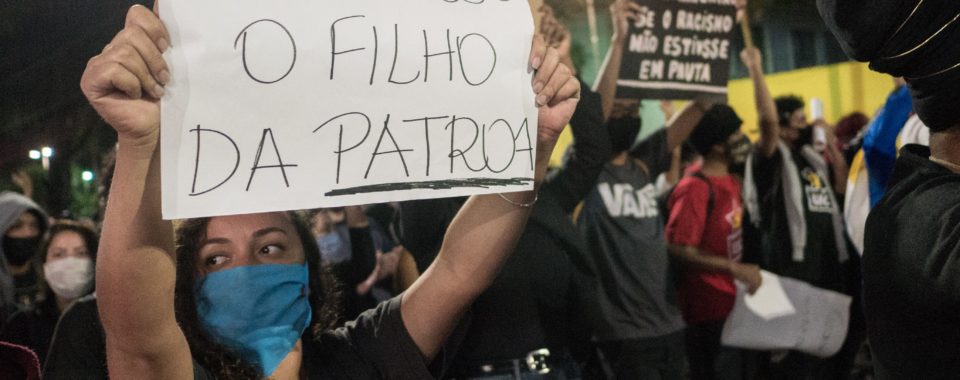BY NATALIE SILVEIRA
A steady decline in social and political cohesion in Brazil over the last eight years, as measured by the FSI, has created a situation of increasing precarity. This sharp worsening coincided with a reduction in public confidence in institutions following the 2016 impeachment of former President Dilma Rousseff. As an indication of President Bolsonaro’s authoritarian proclivities, he was quoted in April 2020 as saying, “Really, I am the Constitution.[1]” In this context, when COVID-19 struck, instead of a collective and coordinated response which may otherwise have reduced the crisis, there was further division and suffering. By June 2022, Brazil had registered more than 31 million confirmed cases of COVID-19 and more than 668,000 deaths, the second highest rate of COVID deaths in the world in absolute numbers, after the United States.[2]
President Bolsonaro downplayed the danger, criticized masks, said vaccines might spread AIDS, and advocated untested alternative treatments.[3] Since the pandemic began, there have been four health ministers[4] and numerous allegations of corruption and fraud in the purchase of vaccines and medicines. Faced with criminal investigations, the president threatened the Supreme Court with unspecified actions, ”not within the bounds of the constitution.”[5] In April 2021, the Federal Senate set up the COVID-19 Comissão Parlamentar de Inquérito (CPI), to investigate irregularities in Brazilian government spending during the management of the pandemic. By October, when the CPI report was published, Bolsonaro was accused of committing 9 crimes, including misuse of public funds.[6] A highly polarized media environment further divides left from right in Brazil and engenders distrust in the public square as a space for discussion, debate, and consensus-building. The Bolsonaro administration has used a military dictatorship-era national security law to issue arrest warrants for at least 17 critics.[7]
Minority groups have also become more vulnerable in recent years. Despite a history of social tolerance and inclusion, Brazil has one of the highest rates of violence against LGBTQIA+ people in the world.[8] In the South and Southeast regions, there was a reported increase of neo-Nazi cells, from 349 in 2020 to 530 in May 2021.[9] Illegal mining and deforestation in the Northern region, has increasingly affected the livelihoods of indigenous and traditional (quilombola) communities. In June 2021, the UN Special Advisor to the Secretary-General on the Prevention of Genocide expressed particular concern about the risk to indigenous people in Brazil.[10] Indigenous people have been severely affected by the pandemic, and in August 2021 indigenous leaders accused the government of targeting them and their livelihoods through the dismantling of social and environmental protection institutions.[11]
Setting the stage for a political clash between left and right, a Supreme Court judge overturned the convictions of former President Luiz Inácio Lula da Silva (2003-2010) allowing him to run for President in October 2022.[12] As those elections draw nearer, attempts are being made to discredit the country’s electoral system, using claims of fraud and the need to replace the electronic voting system with paper ballots. When Congress rejected Bolsonaro’s proposed changes to the electoral system, he suggested he might cancel the elections altogether.[13]
After a steady worsening in the FSI scores from 2014 to 2021, this year the overall score has improved as the economy begins to recover slightly. But in a scenario of greater impunity and fetishization of police violence and a continued worsening in Human Rights, Public Services, and Demographic Pressures, and near record high scores for Group Grievance, and Factionalized Elites, Brazil is going into an election period that could
[1] https://www.economist.com/taxonomy/term/7/0?page=1
[2] https://systems.jhu.edu/research/public-health/ncov/
[3] https://freedomhouse.org/country/brazil/freedom-world/2022
[4] https://www.bbc.com/news/world-latin-america-56410626
[5] https://www.hrw.org/world-report/2022/country-chapters/brazil
[6] https://www.cnnbrasil.com.br/politica/leia-a-integra-do-relatorio-final-da-cpi-da-pandemia/
[7] https://www.hrw.org/world-report/2022/country-chapters/brazil
[8] https://freedomhouse.org/country/brazil/freedom-world/2022
[9] https://www.state.gov/wp-content/uploads/2022/03/3136152_BRAZIL-2021-HUMAN-RIGHTS-REPORT.pdf
[10] https://reliefweb.int/report/world/remarks-ms-alice-wairimu-nderitu-special-adviser-secretary-general-prevention-genocide
[11] https://www.state.gov/wp-content/uploads/2022/03/3136152_BRAZIL-2021-HUMAN-RIGHTS-REPORT.pdf
[12] https://www.dw.com/en/brazil-judge-annuls-convictions-against-lula-da-silva/a-56810379
[13] https://www.hrw.org/world-report/2022/country-chapters/brazil
Image licensed under Upsplash worldwide copyright license .
